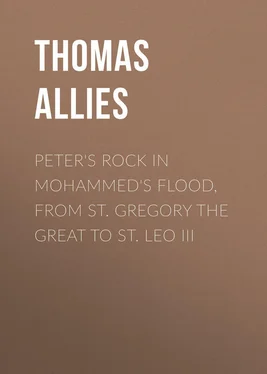Thomas Allies - Peter's Rock in Mohammed's Flood, from St. Gregory the Great to St. Leo III
Здесь есть возможность читать онлайн «Thomas Allies - Peter's Rock in Mohammed's Flood, from St. Gregory the Great to St. Leo III» — ознакомительный отрывок электронной книги совершенно бесплатно, а после прочтения отрывка купить полную версию. В некоторых случаях можно слушать аудио, скачать через торрент в формате fb2 и присутствует краткое содержание. Издательство: Иностранный паблик, Жанр: foreign_antique, foreign_prose, Историческая проза, на английском языке. Описание произведения, (предисловие) а так же отзывы посетителей доступны на портале библиотеки ЛибКат.
- Название:Peter's Rock in Mohammed's Flood, from St. Gregory the Great to St. Leo III
- Автор:
- Издательство:Иностранный паблик
- Жанр:
- Год:неизвестен
- ISBN:нет данных
- Рейтинг книги:4 / 5. Голосов: 1
-
Избранное:Добавить в избранное
- Отзывы:
-
Ваша оценка:
- 80
- 1
- 2
- 3
- 4
- 5
Peter's Rock in Mohammed's Flood, from St. Gregory the Great to St. Leo III: краткое содержание, описание и аннотация
Предлагаем к чтению аннотацию, описание, краткое содержание или предисловие (зависит от того, что написал сам автор книги «Peter's Rock in Mohammed's Flood, from St. Gregory the Great to St. Leo III»). Если вы не нашли необходимую информацию о книге — напишите в комментариях, мы постараемся отыскать её.
Peter's Rock in Mohammed's Flood, from St. Gregory the Great to St. Leo III — читать онлайн ознакомительный отрывок
Ниже представлен текст книги, разбитый по страницам. Система сохранения места последней прочитанной страницы, позволяет с удобством читать онлайн бесплатно книгу «Peter's Rock in Mohammed's Flood, from St. Gregory the Great to St. Leo III», без необходимости каждый раз заново искать на чём Вы остановились. Поставьте закладку, и сможете в любой момент перейти на страницу, на которой закончили чтение.
Интервал:
Закладка:
I propose to treat in this volume of a period embracing two hundred years. It runs from the time of St. Gregory the Great to the founding of the holy Roman empire, in the person of Charlemagne, by Pope St. Leo III.
But, before entering on this treatment, it seems to me called for to make one remark on all which I have hitherto written or am hereafter to write, and to draw out distinctly a principle which affects every line of my narrative. This is the necessity of considering the Church as the one kingdom of Christ in all ages: one and the same polity from the Day of Pentecost to the Day of Judgment. This idea has always been before me as the rule of faith in writing the six preceding volumes. It has been the major premiss of my whole argument. To a Catholic the unity of the Church is as necessary as the unity of God; and, equally, to say that the Church is fallible is to deny the existence of any such thing as the kingdom of God upon earth. The sooner that anything which is fallible is swept away the better. The one duty which we owe to fallibility is to label it. The thing called public opinion is fallible, and, accordingly, every generation sweeps it away and substitutes a fresh fallibility, destined to disappear after a similar ascendency, which waxes and wanes in varying durations of time. Division is the strongest proof of fallibility in that which is divided, as unity is of truth in that which remains one mass. For this cause those who substitute national churches in a particular country under the political head of that country, whether king, president, or parliament, for the one divine polity in all countries, are divided from my argument by an impassable gulf. They no more believe in the Church which is “the house of God, the pillar and basis of the truth,” than he who sets up three gods believes in one Infinite Creator and Rewarder of His creatures. The decrees of a General Council in matters of faith are not recognised by them as part of the divine deposit; for to them they are not acts of the Sovereign Lord in His plenary council. The lessons of history fail to convey any definite impressions to minds in which this idea is wanting. Rather the lessons of history affect them as the heathen was affected who heard the description of our Lord's sufferings undergone for his redemption only to exclaim, “Was it not a long time ago?” There are facts, but no connection. A strong instance of this is that the want of written records in the first three centuries is not made up to them by the acts of the Church in the fourth, fifth, and sixth centuries, because to them the Church is not a polity instinct with one life and following from the beginning identical rules of government. On the contrary, they argue from the silence of perished documents in the three earliest centuries against the recorded practice of the three centuries following. Thus to them the acts of the Church in the Council of Ephesus in 431, the next ecumenical council to the Nicene, throw no light upon the acts of the Church in the Nicene, of which no full record exists. Nor, again, do the acts of the Council of Chalcedon illustrate to them the antecedent constitution of the Church. And the supplication of the Eastern emperor, Marcian, to Pope St. Leo to confirm those acts tells them nothing as to the relation of the Council to the Pope in the time of the Nicene Council. Less even than infidels, who reject the Christian revelation altogether, but have a regard for historical sequence, do the nurslings of a national church, especially if it was in origin a queen's love-child, and then dandled on the knees of successive kings, understand the majesty of the Apostolic See, as set forth in the words of our Lord, or as unfolded in the course of ages. If the political constitution under which they live be a system of compromise, they are tempted to make the constitution of the Church a similar system, in which a change of ministry alters or even reverses the policy of a kingdom. “The holy Catholic Church, the communion of saints,” is not an entity to such minds. Therefore they fail to appreciate the proof of the one polity at the head of which St. Peter's successor stands. For some that polity ceased to exist in the fifth century; for others in the ninth; for others in the sixteenth; for all such it is non-existent in the nineteenth. It is for them as the human soul for the infidel surgeon: he cannot find it under his knife. Or as God for the infidel astronomer: he cannot see God in the order of the universe, though he will receive what physicists tell him, that the universe is absolutely one.
But I write for those to whom history is intelligible, because it is an order of events unrolling itself as a drama at once human and divine; to whom the human soul makes itself known by its acts; to whom “the heavens declare the glory of God, and the firmament shows his handiwork – day unto day utters speech, and night unto night showeth knowledge.” To whom likewise there is one “Jesus Christ yesterday and to-day, and the same for ever”: yesterday at Pentecost with St. Peter and the apostles and our Blessed Lady; to-day with Leo XIII. at Rome and nineteen hundred years of doctors, martyrs, and saints; “the same for ever” at the Day of Judgment.
And now I turn another leaf in the book of human actions, which our Lord holds on His knees and unfolds in His history of His one Church.
During the whole pontificate of St. Gregory he was defending himself against the deceit and despotism of the man whom he acknowledged as his lawful sovereign, the Byzantine emperor. The despotism usually veiled itself in deceit, while the deceit rested upon the despotism rooted in the heart of the eastern that he was lord of the world. Worse than the Lombards, who pursued to the very gates of Rome the people nourished by Gregory on the Church's patrimonium, who spoiled, maimed, and tortured those whom they could catch, were the intrigues of the imperial lieutenants, the exarchs of Ravenna, plotting with the Lombards, enemies of the emperor, against his subjects, the Pope and his Romans. With this state of things the seventh century begins, and so it continues to the end. We have to consider the great events which took place in this century, and especially to point out their connection with this fact of the Byzantine temporal despotism as it was turned upon the spiritual power.
Again, during his whole pontificate, St. Gregory was resisting the attempts of the bishops of Constantinople to extend their power. In his own time it would seem to have been an effect of Justinian's legislation that the Roman See accepted them as patriarchs, which Pope Gelasius denied them to be. Not only so but in every step of their advancement they were backed by the emperors to go on yet further by pushing their See under the title of Ecumenical to a position over the eastern empire parallel to that of the Pope over the West, while it was subordinate at the same time to the emperor himself. The four-and-twenty immediate successors of St. Gregory, from Pope Sabinian, elected in 604, to Pope Constantine, who died in 715, were exposed to the full force of this attempt. The bearing of it upon the rise of the Mohammedan empire will appear more and more as we proceed in the history of this terrible century.
The first event on which we must dwell for a time on account of its great effect upon the history of the century, is the long continued hostility between the eastern and the Persian empires. In the year 602 the general Phocas had deposed the emperor Mauritius. From his reign most Byzantine historians date the ever increasing calamities of the empire. The popular feeling that a bad ruler is a judgment from God was expressed in the story that a pious monk once asked, O God, why hast Thou set this man over us as emperor? when he received for answer, Because I could find none worse. Phocas reigned about seven years, and his end was as follows. The patriarch Thomas had, by his entreaties, drawn to Constantinople Theodore of Siceon, who enjoyed a great reputation for holiness. The mind of patriarch Thomas had been greatly moved by auguries of misfortune which as it were filled the air. He urged the saint to pray and then to give him his advice. The saint at last yielded to his entreaties and said, “It was my mind not to disturb you. It is not for your good to know these things. But since you will have it so, learn that the incident which troubles you betokens many great misfortunes. Many will leave our religion. Incursions of barbarians will follow, and great blood-shedding. Devastation and insurrection through the whole world. Churches will be deserted. The fall of the divine service and of the empire is approaching: and the adversary is nigh at hand.”
Читать дальшеИнтервал:
Закладка:
Похожие книги на «Peter's Rock in Mohammed's Flood, from St. Gregory the Great to St. Leo III»
Представляем Вашему вниманию похожие книги на «Peter's Rock in Mohammed's Flood, from St. Gregory the Great to St. Leo III» списком для выбора. Мы отобрали схожую по названию и смыслу литературу в надежде предоставить читателям больше вариантов отыскать новые, интересные, ещё непрочитанные произведения.
Обсуждение, отзывы о книге «Peter's Rock in Mohammed's Flood, from St. Gregory the Great to St. Leo III» и просто собственные мнения читателей. Оставьте ваши комментарии, напишите, что Вы думаете о произведении, его смысле или главных героях. Укажите что конкретно понравилось, а что нет, и почему Вы так считаете.












